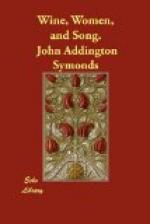Title: Wine, Women, and Song Mediaeval Latin Students’ songs; Now first translated into English verse
Author: Various
Translator: John Addington Symonds
Release Date: March 24, 2006 [EBook #18044]
Language: English
Character set encoding: ASCII
*** Start of this project gutenberg EBOOK wine, women, and song ***
Produced by Michael Ciesielski, Sankar Viswanathan, and the Online Distributed Proofreading Team at http://www.pgdp.net
Wine, women, and song
“Wer liebt nicht
Weib Wein and Gesang
Der bleibt ein Narr sein Lebenslang.”
—Martin Luther.
MEDIAEVAL LATIN STUDENTS’ SONGS
Now First Translated into English Verse
Withan essay
By
John Addington Symonds
London
CHATTO and Windus, Piccadilly
1884
TO
ROBERT LOUIS STEVENSON.
Dear Louis,
To you, in memory of past symposia, when wit (your wit) flowed freer than our old Forzato, I dedicate this little book, my pastime through three anxious months.
Yours,
JOHN ADDINGTON SYMONDS
Villa Emily, San Remo,
May 1884.
Wine, Women, and Song.
I.
When we try to picture to ourselves the intellectual and moral state of Europe in the Middle Ages, some fixed and almost stereotyped ideas immediately suggest themselves. We think of the nations immersed in a gross mental lethargy; passively witnessing the gradual extinction of arts and sciences which Greece and Rome had splendidly inaugurated; allowing libraries and monuments of antique civilisation to crumble into dust; while they trembled under a dull and brooding terror of coming judgment, shrank from natural enjoyment as from deadly sin, or yielded themselves with brutal eagerness to the satisfaction of vulgar appetites. Preoccupation with the other world in this long period weakens man’s hold upon the things that make his life desirable. Philosophy is sunk in the slough of ignorant, perversely subtle disputation upon subjects destitute of actuality. Theological fanaticism has extinguished liberal studies and the gropings of the reason after truth in positive experience. Society lies prostrate under the heel of tyrannous orthodoxy. We discern men in masses, aggregations, classes, guilds—everywhere the genus and the species of humanity, rarely and by luminous exception individuals and persons. Universal ideals of Church and Empire clog and confuse the nascent nationalities.




